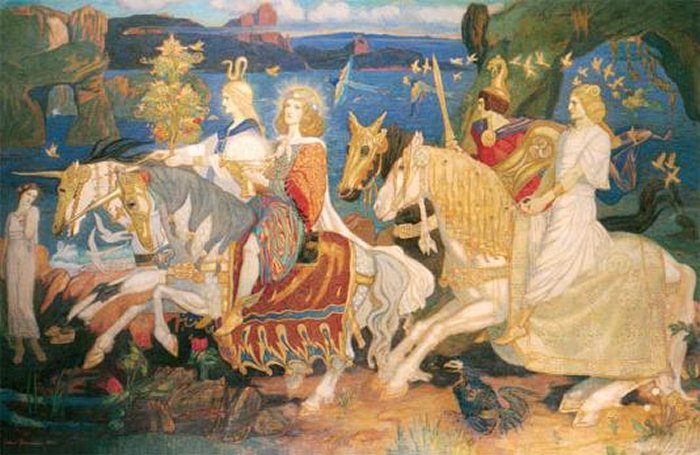King Lud – Mysterious Founder Of London And His Connection To The Tuatha De Danann
Ellen Lloyd - AncientPages.com - Legendary British King Lud is shrouded in a veil of mystery. Did he ever exist? Was he the real founder of London or a Celtic God? What was his connection to the Tuatha De Danann, a mythical race of god-like beings with supernatural abilities?
Historians, mythologists, and folklorists have long tried to unravel the truth about King Lud. Some claim King Lud never existed, while others maintain he was indeed a real historical figure.
Was King Lud a historical or mythological figure? Credit: Adobe Stock - nataljacernecka
Some say King Lud was based on the story of the Welsh mythological figure Lludd Llaw Eraint, a King of the Tuatha De Danann. Still, his life story is a mixture of truth and fiction, making learning more about this exciting personality challenging.
King Lud appears in Geoffrey of Monmouth's legendary History of the Kings of Britain, written around 1136. Geoffrey of Monmouth's chronicles describe the lives of British kings over 2,000 years.
Today considered a pseudohistorical account of British history, Geoffrey of Monmouth's is nevertheless a fascinating read because the work "traces the story of the realm from its supposed foundation by Brutus to the coming of the Saxons some two thousand years later. Vividly portraying legendary and semi-legendary figures such as Lear, Cymbeline, Merlin the magician, and the most famous of all British heroes, King Arthur, is as much myth as history, and other medieval writers questioned its veracity." 1
Was King Lud The Founder Of London?
When examining the ancient history of London, archaeological and historical evidence supports the theory that "Romans established Londinium on the current site of the City of London around 43 AD.
The first definite mention of the city refers to the year 60 AD and occurs in the writings of the Roman historian and senator Tacitus. They wrote of a celebrated center of commerce filled with traders.
Statues of King Lud (centre) and his sons in the porch of St Dunstan-in-the-West Church in the City of London. Credit: Shakespearesmonkey - CC BY 2.0
By the reign of Hadrian, Britannia was a fully developed province of the Roman Empire. One of the Roman outposts was Londinium, which eventually became one of the world's most famous modern cities - London.
Initially, Londinium was just a small military outpost occupying a rather small area of 1.4 km2 (0.5 sq mi), but the city grew rapidly. By the turn of the century, Londinium had grown to about 60,000 people." 2
In 2020, scientists reported new archaeological discoveries "showing it's time to re-write the history of London. Scientists announced everything indicates London is twice as old as previously thought." 3
It brings us to the exciting story of King Lud's adventures in London. According to Geoffrey of Monmouth, King Lud should be credited with constructing several cities and refortifying Trinovantum (London), which he liked especially. Geoffrey stated the name "London" derives from "Caer Lud," or Lud's Fortress.
When King Lud died, he was buried at Ludgate. He was succeeded by his brother Cassibelanus because his two sons, Androgeus and Tenvantius, were not yet of age.
There were statues of King Lud and his two sons on the Lud Gate, but in 1864 Lud Gate was pulled down to make room for carts and pedestrians.
King Lud, a mythical figure thought to be a pre-Roman King of Britain who is said to have founded London and was buried under Ludgate. source
The statues of these intriguing individuals were transported to the Church of St Dunstan-in-the-West, where they still stand. The age of the figures has never been determined.
Has History Forgotten King Lud?
Oliver Hayes, the author of the book King Lud - The Celtic God Who Founded London, examined this King's story based on historical sources and mythological accounts. As Hayes explains, "given that King Lud is said to have lived in about 80bc, it is clear that no writings from his time survive. Our knowledge of Lud relies on things written centuries later.
Another source of knowledge comes from oral history. The Celts were great ones for telling tales and singing songs. Many of these tales celebrated heroes of the past, villains of history, or ancestors of those present. These stories were remembered by bards and minstrels who earned a living by traveling around the country to entertain nobles or peasants at feasts, fairs, and other gatherings.
The stories were not set in stone but changed over time as minstrels sought to bring them up to date, emphasize popular elements or gloss over details unwelcome to the audience they sought to entertain. The tales as we have them were generally written down in the 12th or 13th centuries, but the originals were much older.
A final source for the times of King Lud are the documents collectively known as "the Welsh Genealogies." These were recorded between the 10th and 13th centuries and detail the ancestry of a number of Welsh noble and royal families." 4
Historical records of King Lud's reign are limited, which is why his deeds remain debatable.
Was King Lud A Celtic God?
Searching for clues in mythology, Hayes recalls the adventures of Tuatha Danann and asks whether there is a connection between a Celtic God and King Lud.
"According to the Irish legends, King Nud of the Silver Hand led the Tuatha de Danann when they invaded Ireland. The invasion culminated in the Battle of Moytirra, where the Tuatha de Danann fought the Fir Bolg, the then inhabitants of Ireland.
The Tuatha Dé Danann as depicted in John Duncan's "Riders of the Sidhe" (1911). Image credit: Sevenseaocean - CC BY-SA 4.0
In the battle, Nud had his arm sliced off by a Fir Bolg sword, but the Tuatha de Danann won the war despite this reverse.
There are many references to Nud of the Silver Hand in Irish mythology and folktales, but the main outline of his role is clear. He was an important god and ruler of the gods associated with self-sacrifice and rivers. As well as marrying a river goddess, some have seen his silver arm as representing water.
Such is the Irish god Nud of the Silver Hand. How closely this links to the Welsh Lludd of the Silver Hand is problematic. Few stories have survived about Lludd, and those … treat him more as a prehistoric King of Britain than as a deity." 4
What makes King Lud exceptional is that we will probably never learn whether he was a genuine British King who founded London or a powerful Celtic God. Readers interested in the ancient history of London and mythology might find King Lud worthy of further research.
Written by - Ellen Lloyd – AncientPages.com
Updated on January 11, 2024
Copyright © AncientPages.com All rights reserved. This material may not be published, broadcast, rewritten or redistributed in whole or part without the express written permission of AncientPages.com
Expand for references- Geoffrey of Monmouth - The History of the Kings of Britain
- Sutherland - Londinium: Ancient Roman Outpost That Became Powerful City Of London, AncientPages.com
- Conny Waters - London Is Twice As Old As Previously Thought – New Discovery Reveals, AncientPages.com
- Oliver Hayes - King Lud - The Celtic God Who Founded London
More From Ancient Pages
-
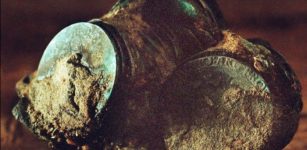 We Need To Look Underwater To Understand Our Past – New Study
Archaeology | Apr 14, 2023
We Need To Look Underwater To Understand Our Past – New Study
Archaeology | Apr 14, 2023 -
 Why Did Modern Humans Replace The Neanderthals? The Key Might Lie In Our Social Structures
Featured Stories | Jun 18, 2024
Why Did Modern Humans Replace The Neanderthals? The Key Might Lie In Our Social Structures
Featured Stories | Jun 18, 2024 -
 Camas Plant Stewardship In The Pacific Northwest Dates Back More Than 3,500 Years
Archaeology | May 23, 2024
Camas Plant Stewardship In The Pacific Northwest Dates Back More Than 3,500 Years
Archaeology | May 23, 2024 -
 First Kisses May Have Helped Spread Oral Herpes 5,000 Years Ago – Scientists Say
Archaeology | Jul 30, 2022
First Kisses May Have Helped Spread Oral Herpes 5,000 Years Ago – Scientists Say
Archaeology | Jul 30, 2022 -
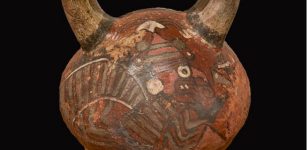 Colors On These Ancient Pots Hint At The Power Of An Empire
Archaeology | Mar 7, 2023
Colors On These Ancient Pots Hint At The Power Of An Empire
Archaeology | Mar 7, 2023 -
 Unravelling The Mystery Of The Ulfberht Sword – An Ancient Viking Artifact Far Ahead Of Its Time
Artifacts | Feb 11, 2014
Unravelling The Mystery Of The Ulfberht Sword – An Ancient Viking Artifact Far Ahead Of Its Time
Artifacts | Feb 11, 2014 -
 Who Was The Sapa Inca?
Featured Stories | Jul 29, 2024
Who Was The Sapa Inca?
Featured Stories | Jul 29, 2024 -
 Intact 1,800-Year-Old Roman Sarcophagus With Unexpected Treasures Found In France
Archaeology | Sep 26, 2023
Intact 1,800-Year-Old Roman Sarcophagus With Unexpected Treasures Found In France
Archaeology | Sep 26, 2023 -
 Yokai Kitsune: Charming And Cunning Liar With Double Nature In Japanese Folklore
Featured Stories | May 22, 2020
Yokai Kitsune: Charming And Cunning Liar With Double Nature In Japanese Folklore
Featured Stories | May 22, 2020 -
 Extraordinary Gold Treasures Found In A Thracian Warrior’s Grave Near Topolovgrad, Bulgaria
Archaeology | Aug 26, 2024
Extraordinary Gold Treasures Found In A Thracian Warrior’s Grave Near Topolovgrad, Bulgaria
Archaeology | Aug 26, 2024 -
 Has Yorkshire’s Lost Underwater Town Ravenser Odd Finally Been Found?
News | Mar 26, 2022
Has Yorkshire’s Lost Underwater Town Ravenser Odd Finally Been Found?
News | Mar 26, 2022 -
 Before Ragnarok: Horrifying Fimbulwinter In Norse Mythology Was Based On Real Events
Featured Stories | Nov 1, 2016
Before Ragnarok: Horrifying Fimbulwinter In Norse Mythology Was Based On Real Events
Featured Stories | Nov 1, 2016 -
 Shinobi No Mono: The Shadow Warriors And Hattori ‘The Demon’ Hanzo Of Ancient Japan
Featured Stories | Apr 8, 2016
Shinobi No Mono: The Shadow Warriors And Hattori ‘The Demon’ Hanzo Of Ancient Japan
Featured Stories | Apr 8, 2016 -
 Bizarre Event – Why Did Hundreds Of Individuals Suddenly Freak Out At A Cemetery?
Featured Stories | May 30, 2023
Bizarre Event – Why Did Hundreds Of Individuals Suddenly Freak Out At A Cemetery?
Featured Stories | May 30, 2023 -
 Inchbrayock Stone: Pictish Samson Stone Carved With Biblical Symbols And Scenes
Artifacts | Jan 21, 2019
Inchbrayock Stone: Pictish Samson Stone Carved With Biblical Symbols And Scenes
Artifacts | Jan 21, 2019 -
 Secrets Of The Two Half Crescent Moons And The Serpent People
Ancient Mysteries | Jan 23, 2020
Secrets Of The Two Half Crescent Moons And The Serpent People
Ancient Mysteries | Jan 23, 2020 -
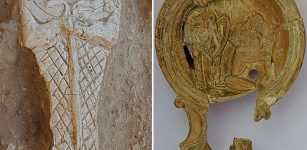 Hellenistic Decorated Tombs And Tombstone Probably Used As A False Door Unearthed In Egypt
Archaeology | Jan 10, 2018
Hellenistic Decorated Tombs And Tombstone Probably Used As A False Door Unearthed In Egypt
Archaeology | Jan 10, 2018 -
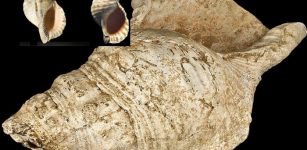 18,000-Year-Old Seashell Was Musical Wind Instrument Used By Magdalenian People
Artifacts | Feb 11, 2021
18,000-Year-Old Seashell Was Musical Wind Instrument Used By Magdalenian People
Artifacts | Feb 11, 2021 -
 Slaves In The Aztec Empire Had Much Better Rights Than In Any Other Ancient Society
Ancient History Facts | Jul 6, 2016
Slaves In The Aztec Empire Had Much Better Rights Than In Any Other Ancient Society
Ancient History Facts | Jul 6, 2016 -
 Ice Age Cycles Played A Key Role In Early Human Interbreeding
DNA | Oct 19, 2023
Ice Age Cycles Played A Key Role In Early Human Interbreeding
DNA | Oct 19, 2023




